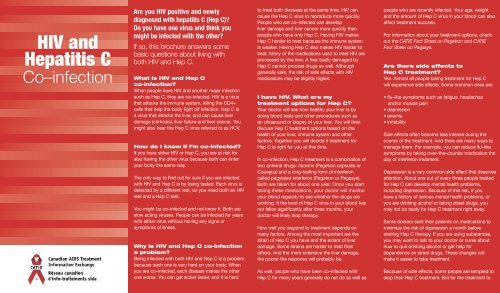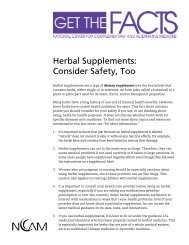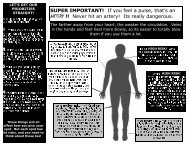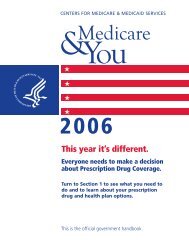What is HIV and Hep C - CATIE
What is HIV and Hep C - CATIE
What is HIV and Hep C - CATIE
Create successful ePaper yourself
Turn your PDF publications into a flip-book with our unique Google optimized e-Paper software.
<strong>HIV</strong> <strong>and</strong><br />
<strong>Hep</strong>atit<strong>is</strong> C<br />
Are you <strong>HIV</strong> positive <strong>and</strong> newly<br />
diagnosed with hepatit<strong>is</strong> C (<strong>Hep</strong> C)?<br />
Do you have one virus <strong>and</strong> think you<br />
might be infected with the other?<br />
If so, th<strong>is</strong> brochure answers some<br />
basic questions about living with<br />
both <strong>HIV</strong> <strong>and</strong> <strong>Hep</strong> C.<br />
Co–infection <strong>What</strong> <strong>is</strong> <strong>HIV</strong> <strong>and</strong> <strong>Hep</strong> C<br />
co–infection?<br />
When people have <strong>HIV</strong> <strong>and</strong> another major infection<br />
such as <strong>Hep</strong> C, they are co–infected. <strong>HIV</strong> <strong>is</strong> a virus<br />
that attacks the immune system, killing the CD4+<br />
cells that help the body fight off infection. <strong>Hep</strong> C <strong>is</strong><br />
a virus that attacks the liver, <strong>and</strong> can cause liver<br />
damage (cirrhos<strong>is</strong>), liver failure <strong>and</strong> liver cancer. You<br />
might also hear the <strong>Hep</strong> C virus referred to as HCV.<br />
How do I know if I’m co–infected?<br />
If you have either <strong>HIV</strong> or <strong>Hep</strong> C, you are at r<strong>is</strong>k for<br />
also having the other virus because both can enter<br />
your body the same way.<br />
The only way to find out for sure if you are infected<br />
with <strong>HIV</strong> <strong>and</strong> <strong>Hep</strong> C <strong>is</strong> by being tested. Each virus <strong>is</strong><br />
detected by a different test, so you need both an <strong>HIV</strong><br />
test <strong>and</strong> a <strong>Hep</strong> C test.<br />
You might be co–infected <strong>and</strong> not know it. Both are<br />
slow acting viruses. People can be infected for years<br />
with either virus without having any signs or<br />
symptoms of illness.<br />
Why <strong>is</strong> <strong>HIV</strong> <strong>and</strong> <strong>Hep</strong> C co–infection<br />
a problem?<br />
Being infected with both <strong>HIV</strong> <strong>and</strong> <strong>Hep</strong> C <strong>is</strong> a problem<br />
because each one <strong>is</strong> very hard on your body. When<br />
you are co–infected, each d<strong>is</strong>ease makes the other<br />
one worse. You can get sicker faster, <strong>and</strong> it <strong>is</strong> hard<br />
to treat both d<strong>is</strong>eases at the same time. <strong>HIV</strong> can<br />
cause the <strong>Hep</strong> C virus to reproduce more quickly.<br />
People who are co–infected can develop<br />
liver damage <strong>and</strong> liver cancer more quickly than<br />
people who have only <strong>Hep</strong> C. Having <strong>HIV</strong> makes<br />
<strong>Hep</strong> C harder to treat because the immune system<br />
<strong>is</strong> weaker. Having <strong>Hep</strong> C also makes <strong>HIV</strong> harder to<br />
treat. Many of the medications used to treat <strong>HIV</strong> are<br />
processed by the liver. A liver badly damaged by<br />
<strong>Hep</strong> C cannot process drugs as well. Although<br />
generally safe, the r<strong>is</strong>k of side effects with <strong>HIV</strong><br />
medications may be slightly higher.<br />
I have <strong>HIV</strong>. <strong>What</strong> are my<br />
treatment options for <strong>Hep</strong> C?<br />
Your doctor will see how healthy your liver <strong>is</strong> by<br />
doing blood tests <strong>and</strong> other procedures such as<br />
an ultrasound or biopsy of your liver. You will then<br />
d<strong>is</strong>cuss <strong>Hep</strong> C treatment options based on the<br />
health of your liver, immune system <strong>and</strong> other<br />
factors. Together you will decide if treatment for<br />
<strong>Hep</strong> C <strong>is</strong> right for you at th<strong>is</strong> time.<br />
In co–infection, <strong>Hep</strong> C treatment <strong>is</strong> a combination of<br />
two antiviral drugs: ribavirin (Pegetron capsules or<br />
Copegus) <strong>and</strong> a long–lasting form of interferon<br />
called pegylated interferon (Pegetron or Pegasys).<br />
Both are taken for about one year. Once you start<br />
taking these medications, your doctor will monitor<br />
your blood regularly to see whether the drugs are<br />
working. If the level of <strong>Hep</strong> C virus in your blood has<br />
not fallen significantly after three months, your<br />
doctor will likely stop therapy.<br />
How well you respond to treatment depends on<br />
many factors. Among the most important are the<br />
strain of <strong>Hep</strong> C you have <strong>and</strong> the extent of liver<br />
damage. Some strains are harder to treat than<br />
others. And the more extensive the liver damage,<br />
the poorer the response will probably be.<br />
As well, people who have been co–infected with<br />
<strong>Hep</strong> C for many years generally do not do as well as<br />
people who are recently infected. Your age, weight<br />
<strong>and</strong> the amount of <strong>Hep</strong> C virus in your blood can also<br />
affect treatment success.<br />
For information about your treatment options, check<br />
out the <strong>CATIE</strong> Fact Sheet on Pegetron <strong>and</strong> <strong>CATIE</strong><br />
Fact Sheet on Pegasys.<br />
Are there side effects to<br />
<strong>Hep</strong> C treatment?<br />
Yes. Almost all people taking treatment for <strong>Hep</strong> C<br />
will experience side effects. Some common ones are:<br />
• flu–like symptoms such as fatigue, headaches<br />
<strong>and</strong>/or muscle pain<br />
• depression<br />
• anemia<br />
• irritability<br />
Side effects often become less intense during the<br />
course of the treatment. And there are many ways to<br />
manage them. For example, you can reduce flu–like<br />
symptoms by taking over–the–counter medication the<br />
day of interferon treatment.<br />
Depression <strong>is</strong> a very common side effect that deserves<br />
attention. About one out of every three people treated<br />
for <strong>Hep</strong> C can develop mental health problems,<br />
including depression. Because of th<strong>is</strong> r<strong>is</strong>k, if you<br />
have a h<strong>is</strong>tory of serious mental health problems, or<br />
you are drinking alcohol or taking street drugs, you<br />
may not be ready for <strong>Hep</strong> C treatment right away.<br />
Some doctors start their patients on medications to<br />
minimize the r<strong>is</strong>k of depression a month before<br />
starting <strong>Hep</strong> C therapy. If you are using substances,<br />
you may want to talk to your doctor or nurse about<br />
how to quit drinking alcohol or get help for<br />
dependence on street drugs. These changes will<br />
make it easier to take treatment.<br />
Because of side effects, some people are tempted to<br />
stop their <strong>Hep</strong> C treatment. But for the treatment to
work, it <strong>is</strong> important to take all doses exactly as<br />
prescribed. If you experience bad side effects,<br />
you should talk to your doctor or nurse about<br />
ways to prevent or reduce them.<br />
Are <strong>Hep</strong> C treatments safe<br />
during pregnancy?<br />
No. The drugs used to treat <strong>Hep</strong> C can harm a<br />
fetus. Women who are pregnant or are thinking<br />
about having a baby should NOT use the drugs<br />
to treat <strong>Hep</strong> C during pregnancy or for at least six<br />
months before becoming pregnant. Th<strong>is</strong> <strong>is</strong> also<br />
true for the male partner of women who are or<br />
want to get pregnant. If you or your partner are<br />
pregnant or want to have a baby, talk to your<br />
doctor first.<br />
Do <strong>Hep</strong> C treatments have any<br />
effect on <strong>HIV</strong> treatments?<br />
They can. Tell your doctor about all the medications<br />
you are taking so that he or she can be sure that they<br />
do not affect each other. Because of the interaction<br />
between medications for <strong>HIV</strong> <strong>and</strong> <strong>Hep</strong> C, some<br />
doctors prefer to treat one d<strong>is</strong>ease at a time.<br />
Sometimes doctors treat <strong>Hep</strong> C first to limit the<br />
damage it may cause to the liver. When <strong>Hep</strong> C <strong>is</strong><br />
treated early enough, it may be possible to get rid of<br />
all signs of the virus in the blood <strong>and</strong> reverse the<br />
damage to the liver.<br />
Sometimes doctors choose to treat the <strong>HIV</strong> first to<br />
increase CD4+ cell counts <strong>and</strong> strengthen the<br />
immune system. People living with <strong>HIV</strong> who have<br />
CD4+ cell counts over 500 may respond better to<br />
the treatment for <strong>Hep</strong> C than those with lower CD4+<br />
cell counts.<br />
In some cases, doctors treat both <strong>HIV</strong> <strong>and</strong> <strong>Hep</strong> C<br />
at the same time. They will take extra care to<br />
ensure that the treatment for one d<strong>is</strong>ease <strong>is</strong> not<br />
making the other d<strong>is</strong>ease worse.<br />
<strong>What</strong> can I do to<br />
protect my health?<br />
If you think you might have been infected with<br />
<strong>HIV</strong> or <strong>Hep</strong> C, get tested. All treatments work<br />
better when you are diagnosed early, before the<br />
viruses have time to damage your immune system<br />
<strong>and</strong>/or your liver.<br />
If you are co–infected with <strong>HIV</strong> <strong>and</strong> <strong>Hep</strong> C,<br />
protecting your liver <strong>is</strong> important. It’s a vital organ<br />
in your body. It processes vitamins <strong>and</strong> minerals<br />
<strong>and</strong> filters your blood. Protecting your immune<br />
system <strong>is</strong> important too. It helps you fight off<br />
d<strong>is</strong>ease <strong>and</strong> stay healthy.<br />
If you are infected with <strong>HIV</strong>, <strong>Hep</strong> C or both, here are<br />
some ways you can protect your liver <strong>and</strong> your<br />
immune system:<br />
• Eat healthy, nutritious food.<br />
• Get lots of sleep <strong>and</strong> exerc<strong>is</strong>e. If you cannot sleep<br />
for long periods, take naps.<br />
• Avoid alcohol <strong>and</strong> street drugs. They can damage<br />
the liver.<br />
• Drink lots of water.<br />
• Quit or cut back on smoking.<br />
• Be vaccinated to protect yourself from<br />
hepatit<strong>is</strong> A <strong>and</strong> B.<br />
• Tell your doctor if you are taking any other drugs,<br />
including prescription <strong>and</strong> non–prescription<br />
medications, <strong>and</strong> complementary therapies. They<br />
may interact with your <strong>HIV</strong> or <strong>Hep</strong> C treatments.<br />
• If you are considering herbs or supplements for<br />
your liver, talk to your doctor.<br />
• Protect yourself from re–infection with <strong>HIV</strong> or <strong>Hep</strong> C.<br />
<strong>What</strong> can I do to protect myself<br />
<strong>and</strong> others from <strong>HIV</strong> <strong>and</strong> <strong>Hep</strong> C?<br />
In addition to protecting others, it <strong>is</strong> very important to<br />
reduce your chance of being re–infected with other<br />
strains of either virus. The more strains you have, the<br />
harder both d<strong>is</strong>eases are to treat.<br />
Both <strong>HIV</strong> <strong>and</strong> <strong>Hep</strong> C can pass from person to<br />
person. <strong>HIV</strong> spreads during unprotected sex <strong>and</strong><br />
by using contaminated needles <strong>and</strong> other drug<br />
equipment. <strong>Hep</strong> C spreads mainly by using<br />
contaminated needles, straws, spoons <strong>and</strong> other<br />
drug equipment used to inject or snort drugs.<br />
Unprotected sex <strong>is</strong> another way to transmit <strong>Hep</strong> C,<br />
particularly among people with <strong>HIV</strong>. There <strong>is</strong> also a<br />
small r<strong>is</strong>k that <strong>Hep</strong> C can be spread by unsafe<br />
tattooing <strong>and</strong> by sharing razors, sc<strong>is</strong>sors<br />
or toothbrushes.<br />
To protect yourself <strong>and</strong> others:<br />
• If you use drugs, do not share or re–use needles<br />
or other equipment. Cleaning equipment with<br />
bleach will kill <strong>HIV</strong>, but it may not stop <strong>Hep</strong> C.<br />
• Practice safer sex. Use condoms.<br />
• Do not donate blood, semen or organs.<br />
• Practice safer tattooing. Do not re–use needles.<br />
• Do not share razors or toothbrushes.<br />
Want more information about <strong>HIV</strong><br />
<strong>and</strong> <strong>Hep</strong> C co–infection?<br />
Your doctor <strong>and</strong> other members of your health care<br />
team are good sources of information. They should<br />
be able to answer your questions about <strong>HIV</strong> <strong>and</strong><br />
<strong>Hep</strong> C co–infection <strong>and</strong> your treatment options.<br />
You might want to use th<strong>is</strong> brochure to start a<br />
d<strong>is</strong>cussion. For more detailed information, be sure<br />
to check out the <strong>CATIE</strong> Fact Sheet on <strong>Hep</strong>atit<strong>is</strong> C.<br />
Production of th<strong>is</strong> publication has been made possible through financial contributions from:<br />
Public Health Agency of Canada<br />
–<strong>and</strong>–<br />
Printed on paper made from 100% post–consumer waste<br />
<strong>What</strong> you need to know<br />
• If you have <strong>HIV</strong>, you should consider getting a<br />
hepatit<strong>is</strong> C test because effective management<br />
of both viruses improves your chances of<br />
protecting your health.<br />
• <strong>Hep</strong>atit<strong>is</strong> C treatment can affect your <strong>HIV</strong><br />
treatment. You <strong>and</strong> your doctor will decide<br />
on the best way to manage both infections.<br />
• <strong>Hep</strong>atit<strong>is</strong> C treatment involves daily pills plus<br />
weekly injections. Your doctor can give you<br />
advice on how to deal with the side effects<br />
of treatment.<br />
• Protect yourself <strong>and</strong> others by not sharing<br />
drug equipment <strong>and</strong> by having safer sex.<br />
<strong>CATIE</strong> (Canadian AIDSTreatment Information<br />
Exchange) provides extensive information about<br />
all aspects of <strong>HIV</strong> treatment. We also provide<br />
information on <strong>Hep</strong> C. All calls, mailings <strong>and</strong> other<br />
contacts are treated confidentially. Contact <strong>CATIE</strong><br />
online or by phone at<br />
www.catie.ca<br />
1.800.263.1638<br />
D<strong>is</strong>claimer<br />
Dec<strong>is</strong>ions about particular medical treatments should always be made in consultation<br />
with a qualified medical practitioner knowledgeable about <strong>HIV</strong>-related illness <strong>and</strong> the<br />
treatments in question. The Canadian AIDSTreatment Information Exchange (<strong>CATIE</strong>) in<br />
good faith provides information resources to help people living with <strong>HIV</strong>/AIDSwho w<strong>is</strong>h<br />
to manage their own health care in partnership with their care providers. Information<br />
accessed through or publ<strong>is</strong>hed or provided by <strong>CATIE</strong>, however, <strong>is</strong> not to be considered<br />
medical advice. We do not guarantee the accuracy or completeness of any information<br />
publ<strong>is</strong>hed by <strong>CATIE</strong>. Users relying on th<strong>is</strong> information do so entirely at their own r<strong>is</strong>k.

















